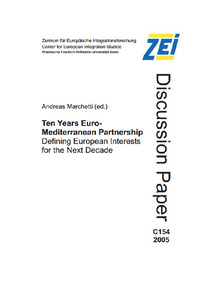Calleya, Stephen; Ortega, Martin; Marchetti, Andreas; Michalek, Jan J.; Kühnhardt, Ludger: Ten years Euro-Mediterranean partnership : defining European interests for the next decade. Bonn: Zentrum für Europäische Integrationsforschung (ZEI), 2005. In: Marchetti, Andreas (Hrsg.): ZEI Discussion Paper, C154.
Online-Ausgabe in bonndoc: https://hdl.handle.net/20.500.11811/10067
Online-Ausgabe in bonndoc: https://hdl.handle.net/20.500.11811/10067
@techreport{handle:20.500.11811/10067,
author = {{Stephen Calleya} and {Martin Ortega} and {Andreas Marchetti} and {Jan J. Michalek} and {Ludger Kühnhardt}},
editor = {{Andreas Marchetti}},
title = {Ten years Euro-Mediterranean partnership : defining European interests for the next decade},
publisher = {Zentrum für Europäische Integrationsforschung (ZEI)},
year = 2005,
series = {ZEI Discussion Paper},
volume = C154,
note = {In November 2005, the European Union and its Mediterranean partners celebrate the tenth anniversary of the Euro-Mediterranean Partnership (EMP) that was initiated in Barcelona in 1995. Whereas in the beginning, the so-called Barcelona-Process responded mainly to concerns articulated by Southern EU-members, the necessity of a structured framework for the EU’s relations with Mediterranean countries is nowadays widely recognised among all members of the Union. This is the result of general developments in international relations but also of the establishment of a functioning multilateral framework for structured dialogue and cooperation with Mediterranean partners on behalf of the EU.
However, whether after the first ten years of existence the Euro-Mediterranean Partnership can be considered a success depends largely on the initial expectations attributed to the project. Surely, many shortcomings can be identified, especially if it comes to the concrete implementation of policies within the EMP-framework, but the process has also shown unique strengths on which the EU’s future policy can be built on. First of all, it has to be borne in mind that the “invention” of the EMP-format in 1995 established a totally new policy design for the EU’s Mediterranean policy that had not been tested before. Besides, via the EMP a more or less consistent framework for enhancing relations multilaterally as well as bilaterally could be created. Another non-negligible feature is that the EMP managed to bring together very different partners and to maintain a frequent dialogue even in cases of rising tensions between them. By doing so, the EMP was successful in creating a better climate for the further development of Euro-Mediterranean relations and of Mediterranean-Mediterranean relations as well.
Nonetheless, the process has been far from perfect. After ten years of EMP it is therefore time to evaluate the process but also – and much more so – to look ahead and try to formulate the agenda for the coming years. The identification of future policy areas and the definition of European interests was at the core of this year’s “Mediterranean Forum”. The contributions outline concrete policy needs and attempt to formulate European interests in the respective areas.
The contributions to the “Sixth Mediterranean Forum” have been compiled in the present Discussion Paper. The authors intend to participate in a debate that is crucial for the EU’s future policy towards its Southern neighbours. Not only because of geographic proximity this eventually is also a debate on Europe itself and its future international role.},
url = {https://hdl.handle.net/20.500.11811/10067}
}
author = {{Stephen Calleya} and {Martin Ortega} and {Andreas Marchetti} and {Jan J. Michalek} and {Ludger Kühnhardt}},
editor = {{Andreas Marchetti}},
title = {Ten years Euro-Mediterranean partnership : defining European interests for the next decade},
publisher = {Zentrum für Europäische Integrationsforschung (ZEI)},
year = 2005,
series = {ZEI Discussion Paper},
volume = C154,
note = {In November 2005, the European Union and its Mediterranean partners celebrate the tenth anniversary of the Euro-Mediterranean Partnership (EMP) that was initiated in Barcelona in 1995. Whereas in the beginning, the so-called Barcelona-Process responded mainly to concerns articulated by Southern EU-members, the necessity of a structured framework for the EU’s relations with Mediterranean countries is nowadays widely recognised among all members of the Union. This is the result of general developments in international relations but also of the establishment of a functioning multilateral framework for structured dialogue and cooperation with Mediterranean partners on behalf of the EU.
However, whether after the first ten years of existence the Euro-Mediterranean Partnership can be considered a success depends largely on the initial expectations attributed to the project. Surely, many shortcomings can be identified, especially if it comes to the concrete implementation of policies within the EMP-framework, but the process has also shown unique strengths on which the EU’s future policy can be built on. First of all, it has to be borne in mind that the “invention” of the EMP-format in 1995 established a totally new policy design for the EU’s Mediterranean policy that had not been tested before. Besides, via the EMP a more or less consistent framework for enhancing relations multilaterally as well as bilaterally could be created. Another non-negligible feature is that the EMP managed to bring together very different partners and to maintain a frequent dialogue even in cases of rising tensions between them. By doing so, the EMP was successful in creating a better climate for the further development of Euro-Mediterranean relations and of Mediterranean-Mediterranean relations as well.
Nonetheless, the process has been far from perfect. After ten years of EMP it is therefore time to evaluate the process but also – and much more so – to look ahead and try to formulate the agenda for the coming years. The identification of future policy areas and the definition of European interests was at the core of this year’s “Mediterranean Forum”. The contributions outline concrete policy needs and attempt to formulate European interests in the respective areas.
The contributions to the “Sixth Mediterranean Forum” have been compiled in the present Discussion Paper. The authors intend to participate in a debate that is crucial for the EU’s future policy towards its Southern neighbours. Not only because of geographic proximity this eventually is also a debate on Europe itself and its future international role.},
url = {https://hdl.handle.net/20.500.11811/10067}
}






